Fleet News Hall of Fame 2018 inductees Maurice Elford and Phil Clifford reflect on their combined 60-plus years in the industry and admit that “nobody sets out to be a fleet manger”. Sarah Tooze reports
It’s not surprising that two long-standing fleet managers, who both retired in January, champion the importance of organisations having someone responsible for managing fleet. But what is surprising is that more chief executives don’t listen to the argument.
After all, company vehicles can be a significant spend for a business – the second or third biggest overhead in many cases – and the legal ramifications if an at-work driver is involved in a road fatality and the business is culpable are huge (fines of up to £20 million for large organisations and a potential jail term for the company director).
There is also the environmental impact of the fleet to consider. It can be one of the biggest contributors to the company’s carbon footprint and, with air quality rising up the political agenda, businesses need to ensure they are running low or even ultra-low emission vehicles.
As Phil Clifford, who spent more than 40 years in local authority fleet management, points out: “You wouldn’t run an organisation without a health and safety manager yet you’ll run hundreds of vehicles without a fleet manager. I don’t think that’s right.
“It doesn’t have to be a full-time role if it’s a very small fleet, but every organisation should have somebody whose sole responsibility it is to ensure compliance and I’d like to see that mandated somehow.”
But more people have to choose fleet management as a career, too, and that needs to start in schools.
Maurice Elford, who spent much of his 26-year career in fleet running the Royal Bank of Scotland’s (RBS) salary sacrifice, job-need and affinity car schemes, says: “I remember Sarah (Millward née Dopson) from The AA standing up at a conference organised by Lombard.
"She was invited to speak as a fleet manager and her opening statement was ‘nobody ever left school saying, ‘I want to be a fleet manager’’ and that’s absolutely true.
“Everybody you have ever met that’s been a fleet manager never set out to be one, none of us.
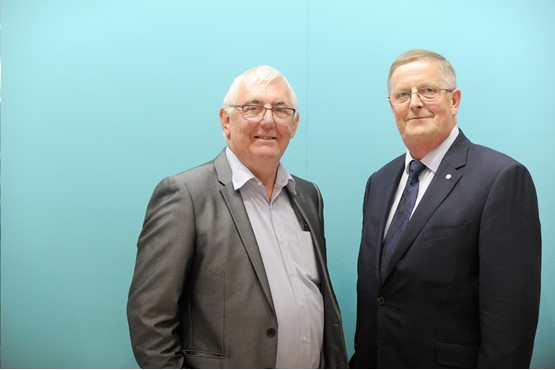
"I suspect if you went to every careers office in every school in the UK fleet management wouldn’t be in there so I’d like to see it promoted as a career choice while you’re still at school.”
Elford has enjoyed the people aspect of fleet management – meeting drivers, suppliers, manufacturers and other fleet managers. And, he says a fleet career can be “great fun”.
“Certainly, with a big fleet I got to go to places, do some things that I would never have done.
“A highlight was being invited by Renault to Silverstone on Grand Prix practice day and going in to the pits and meeting Fernando Alonso. I’ve also been to various car launches all over Europe.”
Clifford agrees: “It’s a people business. Without doubt it’s been tremendous fun. If you weren’t dealing with people on a day-to-day basis it wouldn’t be so much fun.
“I think there is a tremendous satisfaction in starting with a pen and paper and ending up with a bespoke vehicle on the road.
“And I think there is a tremendous amount of respect among your peers in the industry. It’s a good group; it’s a good industry.”
Fleet News: How has fleet changed over the course of your careers?
Maurice Elford: The standards expected these days are far greater than previously. If you think of EU directives, Euro 3, 4, 5, 6. I think the technology in the vehicles is unrecognisable from what it was 20 years ago.
I can remember going to a Ford event at Silverstone not long after I got involved in fleet and it was promoting ABS but it was an added extra.
Since then, we’ve had ESP (electronic stability programme) and AEB (autonomous emergency braking) so vehicles certainly feel a lot safer these days.
Phil Clifford: They are. And, latterly, type approval has actually changed things considerably. Whereas years ago you would specify down to the last nut and bolt what you wanted on the vehicle, nowadays, because of type approval, you can only have what they will offer you.
I think the biggest improvement is probably quality on everything.
Maurice Elford: Everything is built by computer these days.
Phil Clifford: Forty years ago you bought a vehicle and you almost budgeted for the fact it was going to give you trouble for six months until it settled down. You expected a lot of teething problems. Nowadays you buy a vehicle you expect it to be 100% from day one and, generally speaking, it is.
Maurice Elford: The other big change has been fleet management software. When I started doing fleet it was Lotus.
Phil Clifford: Lotus 1-2-3.
Maurice Elford: Yeah, and then this thing called Windows came along.
Phil Clifford: It never fails to surprise me how many small fleets still operate using spreadsheets. It doesn’t work, it’s too prone to going wrong.
Maurice Elford: When I got to L&Q (the London & Quadrant housing association) it was a spreadsheet. The first thing I did was get fleet software.
Fleet News: How has the fleet manager’s role changed?
Phil Clifford: In the public sector in the ’60s and ’70s it was very clearly defined.
Before the 1974 local government reorganisation there were rural districts and urban districts and almost all of them ran their own vehicles, almost all of them had a transport superintendent.
When 1974 came along, they merged a lot of those small authorities into bigger ones, what we now see as districts and boroughs. The transport superintendents were still there when I joined in the ’70s but then in the ’80s, when Margaret Thatcher’s government came in, all of a sudden money was important and everybody was looking to save.
Transport management roles started disappearing and gradually throughout the ’80s with the merging of functions you ended up with non-professionals running the fleet and doing the operations as well.
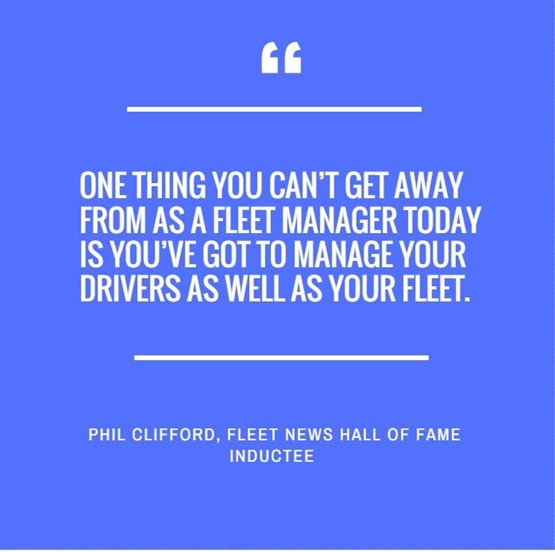
Even now, you’ll see a lot of job descriptions in local government will be ‘cleansing and transport manager’ or ‘fleet and facilities manager’. Seldom is it a dedicated role anymore, which is wrong.
Maurice Elford: L&Q was a bit of a rarity in that it created the post very recently. They had never had a fleet manager or fleet professional until 2013 but they only had 17 cars and about 80 vans.
Phil Clifford: Still, not an insignificant number.
Maurice Elford: No. They knew they were going to expand, they created a DLO (direct labour organisation) so, rather than outsourcing to the likes of Mitie, Mears or whoever, they brought it in-house and there were still two regions to go when I left.
Phil Clifford: Structurally that’s probably been the biggest change in the public sector. With the advent of compulsory competitive tendering in the ’80s, authorities fell into one of two camps. They either thought ‘to hell with it, we’re going to outsource’ or ‘no, we’re going to fight tooth and nail to keep it in-house’.
Some fell in the middle when they fought to keep it in-house and failed and it went out anyway. But those of us that did manage to keep it in-house and carried on keeping it in-house reaped the benefits long-term.
Fleet News: Have the basics of fleet management stayed the same?
Maurice Elford: Yes, you’ve still got to procure, run, dispose of .
Phil Clifford: I did a presentation many years ago and I tried to simplify the role of the fleet manager and I summed it up in three and a bit: A: buy it; B: run it; C: sell it; and D: go back to A.
Maurice Elford: Repeat.
Phil Clifford: Yeah, repeat. And basically that has not changed.
One thing you can’t get away from as a fleet manager today is you’ve got to manage your drivers as well as your fleet. Perhaps 20, 30 years ago you weren’t interested in the drivers, not your problem, that was operations.
But you can’t divorce the two any more so it does become a bit of an issue. You used to say in local government that you got paid by responsibility.
In which case, the fleet manager should be the most highly paid person in the authority because he’s responsible for everybody that gets behind the wheel of the vehicle. But they didn’t buy it; they didn’t give me a pay rise.
Maurice Elford: The other big thing with today’s fleet managers is they’ve got to prove they are compliant because if something happens, heaven forbid, to anybody the authorities will be able to seize computers, records, the whole lot and you’ve got to be able to demonstrate you’ve done all that you reasonably could.
READ MORE: Fleet News Awards 2018: the results
Phil Clifford: I still have a copy of a trade publication where the front page headline was ‘Council loses O Licence’. It was a district council and they got pulled up for a weight check, it snowballed from there. Everything about the whole fleet operation was wrong and it frightened the industry.
It’s like corporate manslaughter. When a company goes down for corporate manslaughter, the Bath tipper crash or whatever, it’s a bit of a wake-up call for everybody. Unfortunately, somebody has to suffer in the meantime.
Maurice Elford: Bath was one of them but the other was Baldwins Crane Hire. We used the Glasgow bin lorry and Baldwins Crane Hire internally as wake up calls – were we compliant enough and did we have the processes in place if the worst happened?
Phil Clifford: The Glasgow bin lorry, I try not to refer to it as a bin lorry because at the end of the day it was a truck in Glasgow that crashed, the fact it was a bin lorry is academic, nothing to do with the argument, but it did highlight the issue of driver management.
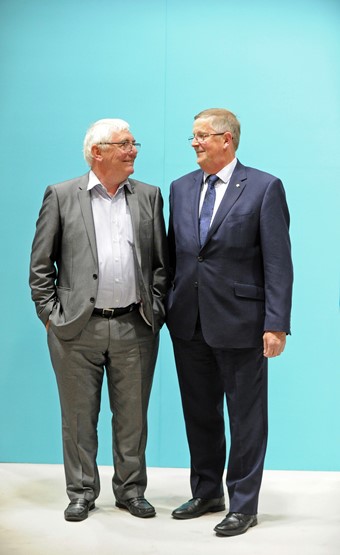
Fleet News: How did you handle difficult conversations with drivers?
Phil Clifford: When you have concrete legislation to back up your argument, those difficult conversations aren’t so difficult. You’re just telling them fact. Whether they like them or not, these are the facts.
Maurice Elford: I’ve had conversations with a few drivers about speeding where I’ve had to say ‘this isn’t a lifestyle choice, it’s the law’. There were lots of 20mph limits and the guys were saying ‘yeah, but a lot of people are flashing us’ so we ended up putting stickers on the back saying ‘this vehicle is monitored for speed and location’.
I did have a degree of sympathy about the aggravation they got for obeying the law.
Phil Clifford: Trying to convince somebody an incident they’ve been involved in was their fault was difficult, everybody denies everything.
I think the onset of technology – cameras, telematics – has helped to actually prove whether it was their fault or not. And even if it proves it was your own driver’s fault it saves you time and money because you don’t spend weeks investigating.
Maurice Elford: The police now, if they’ve got video evidence of an incident, they don’t bother taking witness statements. Insurers are the same.
If someone says, ‘it’s not my fault’ and the other insurer says, ‘well, here’s the video footage’ it’s settled in minutes.
Phil Clifford: That’s made a massive difference to me. Just before I retired we started fitting cameras in the cab.
Maurice Elford: Was that driver-facing?
Phil Clifford: It was driver-facing, crew-facing, but as long as you tell them why it’s there and that’s the only reason you use it, then you’ve got grounds to use it. It’s like telematics, if you say it’s only there for location purposes but then you use the driver behaviour module to discipline somebody, that’s wrong.
Under GDPR (General Data Protection Regulation) you won’t be able to do that. If you tell them you’re going to monitor their driver behaviour, then you’ve covered it.
If you’ve got to go out and investigate incidents when you’re a small organisation it’s very time consuming. So technology is a great help.

Maurice Elford: TfL (Transport for London) fixed penalty notices came through like confetti at the best of times. We had one where the guy was stopped on a red route.
We appealed and said the photograph showed the brake lights on. They said ‘no, appeal refused. You can go to tribunal if you like’. So we got the telematics data.
You could do it by the second so we could clearly show he was stationary then 2mph, stationary then 2mph. So we could prove he was actually moving. We sent that back.
Two weeks later the solicitor had looked it over – case dismissed. But that was a day’s work to prove the guy was innocent.
Phil Clifford: We had a speeding ticket from Cornwall and we wrote back to say ‘it wasn’t our vehicle, I can prove with telematics that it’s a 26-tonne refuse vehicle.
There is no way it would have got to Cornwall and back in a day’. Then they go quiet. So, obviously, the cloning of number plates is not that uncommon.
Maurice Elford: We had one where one of our vans was allegedly parked in Kensington and Chelsea, London. That’s not a borough we operate in and in the photograph the van had no logos on it.
I wrote back and said ‘here’s our van with the logos on it, here’s telematics evidence’. In the end they did drop it. But it was a huge effort to prove, it went on for weeks.
Fleet News: So, you’ve both had some admin challenges, what have been your biggest challenges in fleet and how did you overcome them?
Phil Clifford: I suppose the biggest direct challenge which I always had was trying to get some sense of order into the grey fleet management because there is this gulf between whether grey fleet is an HR function or a fleet function.
And, clearly, it is both. To try to get the team in HR to see the importance was very difficult and still, to this day, is difficult.
Maurice Elford: I had that challenge at L&Q. It sat with HR but I did at least get them to put a disclaimer on the expense system.
Phil Clifford: We ended up with online mileage claims and there was a tick box to confirm you’d got the right insurance etc. I’m never happy with that. It’s not robust enough in my opinion.
Maurice Elford: It’s not been challenged yet.
Phil Clifford: But I always felt we should be physically checking grey fleet documents and taking copies of them.
Maurice Elford: The difficulty we had in RBS was there were 30,000 grey fleet drivers and there was no way you could physically check them all.
We randomly sampled 1% of the expenses claims a month and the system was set up so you couldn’t get selected again for another three years so we could, at least, check your driving licence and, if you were at risk, you’d go on a driver training course.
We couldn’t check all 30,000 every month but by doing a random sample of 100 every month we were going to sample 1,200 a year.
Phil Clifford: The vast majority of grey fleet drivers don’t knowingly under-insure their cars, they don’t understand. They’ve taken out a policy, it’s fully comprehensive, what more do you need?
And the insurance companies are their own worst enemy because sometimes they’ll give you business cover insurance without asking for it and when you renew a year later they’ll knock it off without telling you so I think they could be a bit more transparent on that.
There is nothing wrong with grey fleet as long as it’s managed.
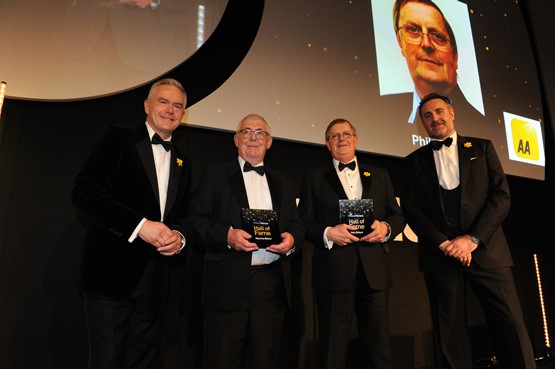
Fleet News: What do you feel private sector fleets could learn from public sector fleets and vice versa?
Phil Clifford: It’s a different world. The language is different. You talk about capital allowances, well to the public sector a capital allowance is something completely different than it is to the private sector so I don’t think there is much they can learn from each other.
I think they perhaps need to understand each other better because if someone joins the public sector from the private they struggle. It’s a different set of rules, different protocols but that’s how we do it. It’s who you’re answerable to as well.
There is a profit motive in the private sector more so than in the public sector, which is not always the best driver – excuse the pun – when it comes to running fleet.
Maurice Elford: In the private sector, fleet is always seen as a cost so you’re under pressure to do the best deal that you can as a service to the shareholder.
Fleet News: What advice do you have for managing suppliers?
Maurice Elford: I always found building relationships was fairly key. Being open and honest enough to say when something wasn’t working and being prepared, when push comes to shove, to say goodbye sometimes.
But that’s really a last resort. I tried hard, particularly with the manufacturers, to build up long-term relationships rather than just phone them up when I needed something.
And software providers, that’s a long-term commitment, and telematics is another one, you don’t want to necessarily change that every three years because the changeover is an absolute nightmare.
So, building relationships is the best way to deal with suppliers I find.
Phil Clifford: I think that’s right. Towards my retirement so many approaches were by phone and internet rather than face-to-face and that’s impersonal. You don’t know who you’re talking to, you can’t gauge body language over the phone.
Maurice Elford: I used to get a lot of phone calls ‘can we come to see you?’ ‘Not really any point because I don’t use that service or product’.
Phil Clifford: I think the worst one is when you get an email saying ‘I’d like to come and see you to show you how I can save you money’. That drives me insane because they don’t even know if I’ve got any money to save. They haven’t got a clue. Sellers need to do their homework before they approach a company.
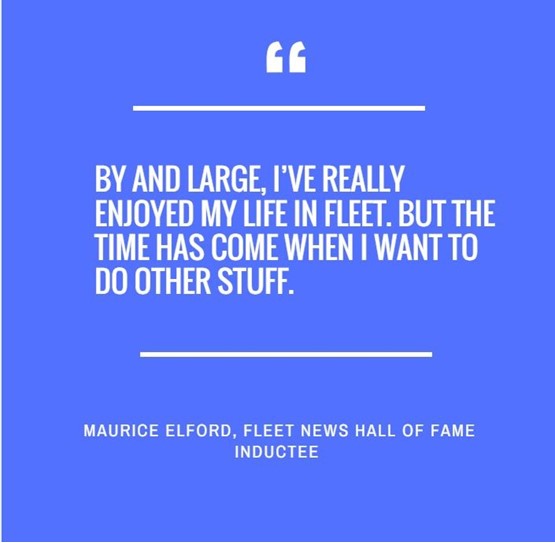
Fleet News: What annoyed you about fleet, Maurice?
Maurice Elford: One thing that drove me nuts was the expected delivery date for your vehicle is X. X then becomes Y. Y then becomes Z. Then it becomes AA, if you’re lucky.
And then you’ve got to tie that in with the launch of a service to an area. I had some sweats over my last three or four years on delivery times.
It wasn’t just getting the vehicle delivered. It was getting the vehicle to the converters and then delivered so that drove me nuts.
Fleet News: How has networking helped your careers? Phil, you founded the Public Authority Transport Network.
Phil Clifford: I worked with Christopher Ruane, who is now with the CILT (Chartered Institute of Logistics and Transport), to set that up years ago. It’s proved its worth over the years; it’s a good network.
Not only does it bring public sector fleet managers together, it enjoys the benefit of the fact that none of them are in competition with each other, so free speech is there.
If you get private sector organisations in a room they’ll be cagey about what they’re saying for fear of giving away their secrets, won’t they?
Maurice Elford: No, I’ve been a member of Major Fleet Forum for a number of years and that’s a mixture of public and private.
What is said in that room stays in that room and everybody adhered to that and it was quite useful because sometimes you had sensitive things that you wanted to get a view on and you could express it there.
Phil Clifford: But there is a certain degree of pragmatism isn’t there?
Maurice Elford: Of course, we were four or five big bank fleet managers who used to meet up two or three times a year and we were grown up enough to know there were things we weren’t going to talk about.
Fleet News: What did you both learn from those networking groups?
Maurice Elford: Lots more people had the same problems as me.
Phil Clifford: I was going to say exactly the same. You think you’ve got all the problems in the world but you can guarantee there is someone else worse off than you are.
Maurice Elford: Or I’ve said something in a meeting and I can see the look of relief on two or three faces because I’ve said it.
Phil Clifford: So, if you had the chance to do it all again, would you?
Maurice Elford: Yeah, there are a few bits I’d do differently. Probably some of the people I dealt with I would have dealt with differently over time.
By and large, I’ve really enjoyed my life in fleet. But the time has come when I want to do other stuff.
Phil Clifford: While you’re still fit and able?
Maurice Elford: Yeah.
Phil Clifford: Same here.
READ MORE: Pictures: Fleet News Awards 2018
Elford’s retirement plans are simply to sail his boat to Holland in the summer (weather permitting) and to “look for something to do come the autumn, go and do some work for a charity perhaps”.
Clifford intends to do some consultancy work for public sector fleets in order to fund other projects such as a procurement guide for the industry (see Fleet News, August 4, 2016), plus he wants to raise the profile of fleet management.
Both joke they are secretly pleased to retire before GDPR takes effect (May 25) although they have endured their fair share of legislative upheavals in their career, including the change of benefit-in-kind taxation to a CO2-based system in 2002 and the introduction of corporate manslaughter in 2008.
With so many changes afoot – GDPR, WLTP (Worldwide harmonised Light vehicle Test Procedure) and Brexit to name but a few – how does today’s fleet manager cope?
“You’ve got to make the effort to keep abreast of what is happening,” Clifford says. “You’ve got to read the trade press and come to events. Don’t even consider this industry unless you’re committed and ambitious because fleet is not just a job; it’s a vocation. Fleet management is a way of life.”



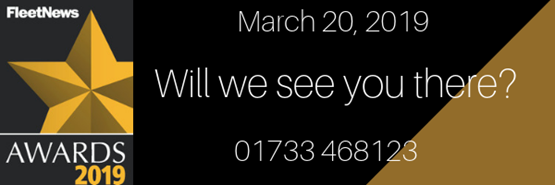















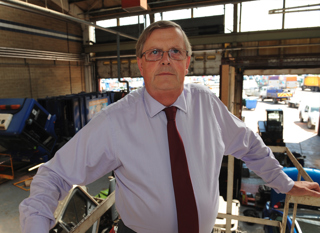
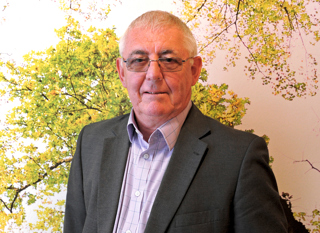
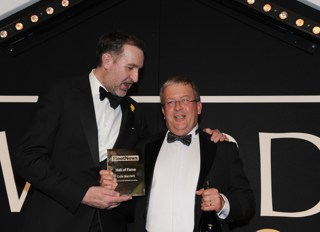
Login to comment
Comments
No comments have been made yet.